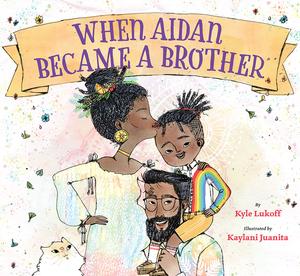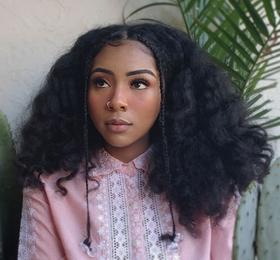
|
|
| Kyle Lukoff (photo: Charles Ludeke) |
|
Earlier this week, school librarian and author Kyle Lukoff won the Stonewall Book Award, given to titles that display "exceptional merit relating to the gay/lesbian/bisexual/transgender experience," for his picture book When Aidan Became a Brother, illustrated by Kaylani Juanita and published by Lee & Low Books.
Congratulations! Thank you so much for chatting with Shelf. To ask the broadest of questions: How are you feeling?
So many different feelings! The Stonewall has been a goal of mine for probably seven years now, when I first started trying to write a young adult novel. For it to actually happen is this hard-to-describe combination of "I can't believe it!" and "I completely believe it." I got more emotional putting the Stonewall sticker on George the year Alex Gino won but, in some ways, I think it's because the feelings are just too big to touch.
I will say that working with young children is great for keeping the ego in check. One of my second graders was literally hanging over my shoulder as Wanda Brown announced my name, asking if I could help him check out a book, and when I was like, "Do you hear those people applauding? They're clapping for me," he just said, "Oh. How many books do I still have checked out?"
When Aidan Became a Brother was, as your author's note describes, a book very close to your heart. Why did you want to write it? And why did you want to write it for a child audience? How does it feel to win this award for it?
For a long time, I didn't want to write it. I knew that I should write a picture book about a trans boy, because there weren't any that had been traditionally published, and I had already sold two picture books and so knew how the process worked. But I didn't like feeling obligated to tell a specific story and felt constrained by simplistic, reductive expectations that seemed to restrict the kinds of trans stories that would be allowed. And then one day, after two different librarians tweeted about the complete dearth of trans boy representation, I had a brainstorm, and what turned into Aidan became a driving force in my career.
Winning the Stonewall seems like what my life has been heading towards for years. I started working in bookstores when I was 16 and came out as queer a year later, so those two themes have been at the center of my life for almost two decades. I'm so lucky that my entire life is basically being gay and reading books.
 Did you have a feeling while writing that this book could have a significant impact?
Did you have a feeling while writing that this book could have a significant impact?
Is it profoundly arrogant of me to say "yes"? Don't get me wrong, I have very low self-esteem and my New Year's resolution was to believe ~15% of the nice things people say about my work (because I hover at around 5%). But I also know that Aidan was something special. For one, while I was working on it, I didn't know of any other picture books about trans boys, with very few self- or micro-published exceptions. I knew that people were desperate for something--anything--and would even take something that was only okay.
But I also knew that Aidan was more than just an okay picture book explaining what trans boys are. When Mom says, "You taught us how important it is to love someone for exactly who they are. This baby is so lucky to have you, and so are we," that was what I wanted trans kids (and their families, and all kids) to hear: that the world is a better place for having you in it. That you are not someone to accept, or to tolerate, or to deal with, but someone to celebrate and welcome with joy and gratitude.
How did it feel when you saw Kaylani Juanita's illustrations of what had been, until then, visions only in your mind?
I'm not a visually oriented person, so I didn't have a clear vision of what the book would look like. And once I saw early sketches, I knew that it would be... well, perfect. The tiny, intricate details I could pore over for hours, but it's also clear where the emotional core of each scene lies. I'm so glad that everyone is recognizing her brilliance, I want Kaylani's career to take off.
What do you hope readers take with them when they finish Aidan? What kind of future would you like to see for this Stonewall-awarded book of yours?
I want readers to leave all of my books with more questions than answers. I'm hoping that with this story, though, those questions aren't, "What did Aidan's name used to be?" or "Is the baby a boy or a girl?" Maybe more like, "I wonder why we don't learn what Aidan's name used to be," and "Why do I care if this baby is a boy or a girl?" Questions that encourage reflection, self-awareness and expanded empathy.
I love that Aidan has a future and I hope the award increases the title's reach in bookstores and schools! I'm also aiming to visit schools all over the country and it would be great if the award helps with that.
Is there anything else you'd like to tell Shelf readers?
The author's note says, "I don't know what the future holds for Aidan, but I hope he lives in a world that supports and believes in him. Thank you for helping to create that world." Every word of that.
---
 |
|
|
Kaylani Juanita |
|
Illustrator Kaylani Juanita won the Stonewall Book Award, given to titles that display "exceptional merit relating to the gay/lesbian/bisexual/transgender experience," for her picture book When Aidan Became a Brother, written by Kyle Kukoff and published by Lee & Low Books.
Congratulations! What was it that drew you to Lukoff's text--that made you think, "I would love to illustrate this"?
After reading the manuscript, my heart completely melted. Kyle's manuscript was a fresh take on an underrepresented identity. The story focuses on Aidan's goals as a future big brother and how his being trans shapes that experience. Overall, it's an amazingly written story that talks about the nuances of being a young trans boy who wants to be the best big brother he can be.
How did you approach the story aesthetically? Did you have certain palettes, textures, images, etc. that you really wanted to include in Aidan's story?
Kyle's writing style and the tone of the story felt very light, airy and gentle. I wanted the color palette to match that. I felt like it was important to include fun patterns and lots of colors to show how expressive and confident Aidan is.
Did you know from the beginning exactly how you wanted this book to look? Or was it a process of discussion and discovery?
I knew I wanted it to look colorful and welcoming. Most of the world-building and overall book design revolved around how I designed Aidan, and there were lots of ongoing conversations and feedback about his character exploration. Kyle was always super supportive of Aidan's clothing and style being fun and colorful--I wanted to avoid making his style and color choices too neutral, dull or stereotypically masculine. I wanted the confidence of his style and identity to radiate throughout the book.
Did you and Kyle talk as you each worked on your own sections of the book? Or was there the standard line of quiet between author and illustrator?
We didn't get to speak until the book was completely finished. All his feedback and suggestions were filtered through editors and the art director. We just met in person toward the end of last year! It was awesome and surreal to see him and hear him in person!
What does it mean to you--and to books like this--to receive this award?
This award means so much to me, and I think it's important that books like this get support and recognition. There needs to be more books written, illustrated and published by POC, QTPOC and LGBTQ+ folks. I am enthused about the award but recognize that it is just the beginning of many things I'd like to accomplish as a black, biracial, queer, woman and illustrator.
Is there anything else you'd like to tell Shelf readers?
Check out the statistics from the Cooperative Children's Book Center School of Education about diversity and inclusivity within picture books. There aren't enough picture books being published that are illustrated and/or written by POCs. Which means there are even less being published about and by queer and trans people of color. We need to make space and support stories for underrepresented people. Inclusive and diverse picture books can help shape a better future for all of us.
Thank you and congratulations again!
Thank you so much for your time and platform!! Also, please check out Magnificent Homespun Brown: A Celebration Book by Samara Cole Doyon and illustrated by me, Kaylani Juanita.

